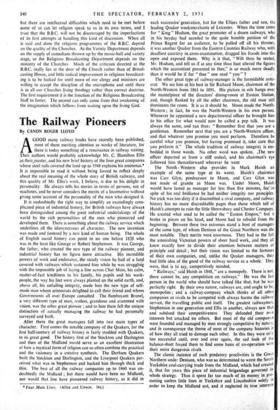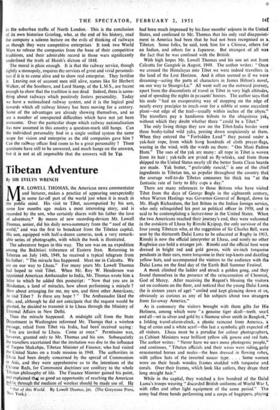The Railway Pioneers
By CANON ROGLR LLOYD GOOD many railway books have recently been published, most of them meriting attention as works of literature, for there is today something of a renaissance in railway writing. Their authors would probably acknowledge Mr. C. Hamilton Ellis as their,master, and his new brief history of the four great companies whose steel rails covered the land up to 1948 explains his eminence.‚ÄĘ It is impossible to read it without being forced to reflect deeply about the real meaning of the whole story of British railways, and this quality of Mr. Ellis's work, 1 believe, is due to his delight in personality. He always tells his stories in terms of persons, not of machines, and he never considers the merits of a locomotive without giving some account of the personality of the man who designed it.
It is undoubtedly the right way to‚ÄĘsimplify an exceedingly com- plicated piece of industrial history, for British railways have always been distinguished among the great industrial undertakings of the world by the rich personalities of the men who pioneered and developed them. There is something about the railway service which underlines all the idiosyncrasies of character. The new invention was made and fostered by a new kind of human being. The whole of English social history can point to no one before 1820 who was in the least like George or Robert Stephenson. It was George, the father, who created the new type of the railway pioneer, and industrial history has no figure.- more attractive. His incredible powers of work and endurance, the steady vision he‚ÄĘhid of a land covered with railways which sustained him while he was struggling with the impossible job of laying a line across Chat Moss, his calm, matter-of-fact kindliness to his family, his pupils and his work- people, the way his feet were always planted Qn the solid earth, and, above all, his unfailing integrity; made him the new type of self- made man wham aristocrats delighted to call their friend and whom Governments all over Europe consulted The flamboyant Brunel, a very different type of man, restless, grandiose and crammed with vision, was the other great pioneer ; and to him there fell the unique distinction of actually managing the railway he had personally surveyed and built.
After them the great managers fall into two main types of character. First comes the notable company of the Quakers, for the first half-centuiy of railway history is fairly studded with Quakers, to its great good. The history frrst. of the Stockton and Darlington and then of the Midland would serve as an excellent illustration of how a mystical form of religion can so often combine the practical and the visionary in a creative synthesis. The Durham Quakers built the Stockton and Darlington, and the Liverpool Quakers per- ceived. what was in Stephenson and backed him through thick and thin. The best of all the railway companies up to 1860 was un- doubtedly the Midland ; but there .would have been no Midland, nor would that line have pioneered railway history, as it did in
'Four Main Lines. (Allen and ,Unwin. 16s.)
each successive' generation, but for the Effises father and son, the
leading Quaker woolrmerchants of Leicester. When the time came for " King " Hudson, the great promoter of a dozen railways, who
in his heyday had acceded to the quite humble petition of the Prince Regent for an audience, to be pulled off all his thrones, it was another Quaker from the Eastern Counties Railway who, with deadliest courtesy in,cross-examination, dragged his frauds into the open and exposed them. Why is it that, " Wilt thou be seated, Mr. Hudson, and tell us if at any time thou hast altered the figures which the accountant presented to thee," is so much more deadly than it would be if for "thee " one read " you " ?
The other great type of railway-manager is the formidable auto- crat. We see him at his best in Sir Richard Moon, chairman of the North-Western from 1861 to 1891. His picture in oils hangs over the mantelpiece of the directors' dining-room at Euston Station, and, though flanked by all the other chairmen, the old man still
dominates the room. It is as it should be. Moon made the North- Western ; in fact, he was the North-Western ‚ÄĘ in his own person. Whenever he appointed a new departmental officer he brought him
to his office for what would now be called a pep talk. It was always the same, and ran thus: " Remember first that you are 'a gentleman. Remember next that you are a North-Western officer, and that whatever you promise you must perform. Therefore be careful .what you promise, but having promised it, take care that you perform it." The whole tradition of railway integrity is em- bedded in those words. No other word was spoken. The new officer departed as from a stiff ordeal, and his chairman's eye followed him thenceforward wherever he went The North - Western also provides in Mark Huish an example of the same type at its worst. Huish's chairman was Carr Glyn, predecessor to Moon, and Carr Glyn was not made of granite as Moon was. Under Moon, Huish would have lasted as manager for less than five minutes, for' in spite of his real brilliance he had neither integrity nor principles.
No trick was too dirty if it discomfited a rival company, and railway history has no more discreditable pages than those which tell of Huish's attempts to ruin the little Shrewsbury and Chester Company.
He created what used to be called the " Euston Empire," but it broke in pieces on his head, and Moon had to rebuild from the beginning. Between these two extremes stand a host of managers of the same type, of whom Denison of the Great Northern was the most notable. Their merits were'enormous. They had to the full the astonishing Victorian powers of sheer hard work, and they all knew exactly how to divide their attention between matters of principle and detail ; but theit vision was limited to the fortunes of their own companies, and, unlike the Quaker managers, they had little idea of the good of the railway service as a whole. They were, that is to say, competitively minded.
" Railways," said Huish in 1848, " are a monopoly. There is not, there cannot be, any competition on railways." He was the last person in the world who should have talked like that, but he was perfectly right. By their own nature, railways are, and ought to-be, monopolies ; and a railway-company which thinks of all other
companies as rivals to be competed with always harms the railway service, the travelling public and itself. The greatest railwaymen, Stephenson in one generation and Ellis in another, always saw that and subdued their competitiveness. They defended their own interests but attacked no others. But most of the old companies were founded and managed by men strongly competitive by nature, and ih consequence the theme of most of the company histories is of how they all tried to damage each other. In this they were only too successful until, over and over again, the sad look of the balance-sheet forced them to find .some basis of co-operation with their more dangerous rivals. The classic instance of such -predatory proclivities is the GI-ea Northern under Denison, who was so determined to wrest the South Yorkshire coal-carrying trade from the Midland, which had created it, that for years this piece of industrial brigandage governed its whole strategy. Thus it spent far too much of its money in pro- moting useless little lines in Yorkshire and Lincolnshire solely in order to keep the Midland out, and it neglected its true interests
in the suburban traffic of North London. This is the conclusion of its own historian Grinling, who, at the end of his history, read the company a solemn lecture on the evils of thinking of railways as though they were competitive enterprises. It took two World Wars to release the companies from the bane of their competitive traditions, and their admirable record in those wars significantly underlined the truth of Huish's dictum of 1848.
The moral is plain enough. It is that the railway service, though rightly a monopoly, requires the services of great and vivid personali- ties if it is to come alive and to show real enterprise. They fertilise it. Leaving out of account men still alive, names like Sir Herbert Walker, of the Southern, and Lord Stamp, of the L.M.S., are tecent enough to show that the tradition is not dead. Indeed, there is some- thing about railways which positively fosters personality. Today we have a nationalised railway system, and it is the logical goal towards which all railway history has been moving for a century. Some of the advantages are already showing themselves, and so are a number of unexpected difficulties which have not yet been overcome. Over the particular shape which railway nationalisation has now assumed in this country a question-mark still hangs. Can the individual personality find in a single unified system the same scope for vision and enterprise as the old companies gave him ? Can the railway officer find room to be a great personality ? These questions have still to be answered, and much hangs on the answers, but it is not at all impossible that the answers will be Yes.



































 Previous page
Previous page